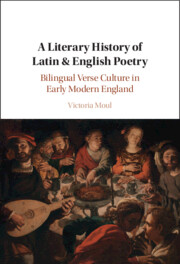Book contents
- A Literary History of Latin & English Poetry
- A Literary History of Latin & English Poetry
- Copyright page
- Dedication
- Contents
- Figures
- Acknowledgements
- Abbreviations
- Introduction
- Part I Shorter Verse
- Chapter 1 Anglo-Latin ‘Moralizing Lyric’ in Early Modern England
- Chapter 2 Metrical Variety and the Development of Latin Lyric Poetry in the Latter Sixteenth Century
- Chapter 3 Buchanan, Beza and the Genre of the Sidney Psalter
- Chapter 4 Formal Panegyric Lyric in England, 1550–1650
- Chapter 5 Abraham Cowley and Formal Innovation
- Chapter 6 Religious and Devotional Epigram and Lyric
- Chapter 7 Epigram Culture and Literary Bilingualism in Early Modern England
- Chapter 8 Satire, Invective and Humorous Verse
- Part II Longer Verse
- Afterword
- Metrical Appendix: Latin Metres
- Bibliography A: Manuscripts
- Bibliography B: Early Printed Books
- Bibliography C: Secondary Literature
- Index
Chapter 7 - Epigram Culture and Literary Bilingualism in Early Modern England
from Part I - Shorter Verse
Published online by Cambridge University Press: 23 June 2022
- A Literary History of Latin & English Poetry
- A Literary History of Latin & English Poetry
- Copyright page
- Dedication
- Contents
- Figures
- Acknowledgements
- Abbreviations
- Introduction
- Part I Shorter Verse
- Chapter 1 Anglo-Latin ‘Moralizing Lyric’ in Early Modern England
- Chapter 2 Metrical Variety and the Development of Latin Lyric Poetry in the Latter Sixteenth Century
- Chapter 3 Buchanan, Beza and the Genre of the Sidney Psalter
- Chapter 4 Formal Panegyric Lyric in England, 1550–1650
- Chapter 5 Abraham Cowley and Formal Innovation
- Chapter 6 Religious and Devotional Epigram and Lyric
- Chapter 7 Epigram Culture and Literary Bilingualism in Early Modern England
- Chapter 8 Satire, Invective and Humorous Verse
- Part II Longer Verse
- Afterword
- Metrical Appendix: Latin Metres
- Bibliography A: Manuscripts
- Bibliography B: Early Printed Books
- Bibliography C: Secondary Literature
- Index
Summary
The rise of the epigram, that most distinctively early modern genre, emerged from the confluence of several elements of literary culture, including humanist Latin epigrams; the distinct (though related) tradition of moralizing and didactic distichs and other short poems; the role of verse composition in schools and universities; and the increasingly important role of translation and bilingual circulation. This chapter outlines the relationship between Latin and English epigram in England between the mid-sixteenth and the later seventeenth century: in doing so, it builds upon previous work which has concentrated on the English-language tradition, and extends the chronological range of the existing studies, none of which ranges beyond 1640. By focusing in particular upon the ways in which epigrams circulated in the manuscript record, it treats epigram culture as a bilingual phenomenon, the bilingualism of which evolved over the course of the later sixteenth and seventeenth centuries, and demonstrates how thekind of‘witty’, topical and frequently satiric epigram, which most critical work has prioritized, sits within a broader and on average more serious and more generalizing literary phenomenon.
Keywords
- Type
- Chapter
- Information
- A Literary History of Latin & English PoetryBilingual Verse Culture in Early Modern England, pp. 271 - 319Publisher: Cambridge University PressPrint publication year: 2022



